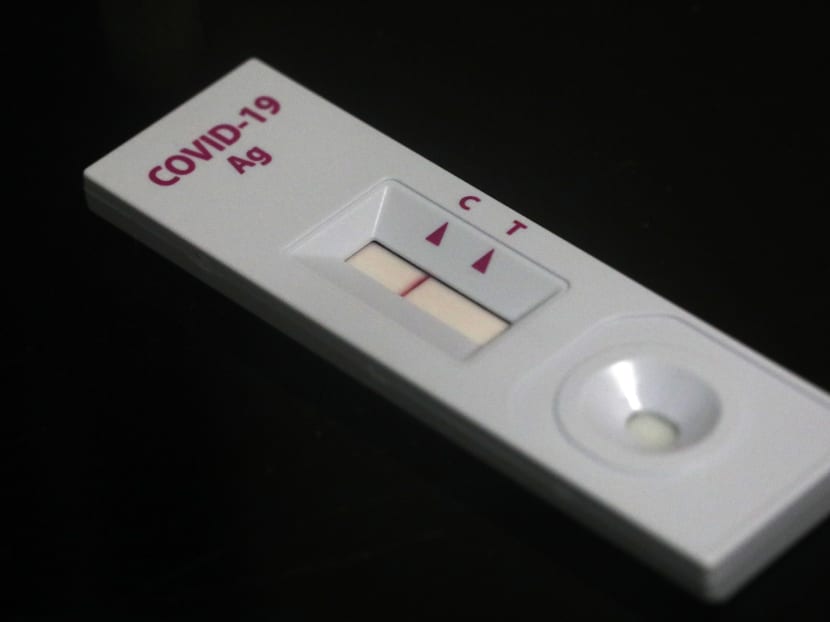Daily Covid-19 tally to include cases detected through antigen rapid tests and reported by GPs: Ong Ye Kung
SINGAPORE — Starting from Friday (Jan 21) night, the authorities will include Covid-19 cases detected via antigen rapid tests in the daily updates on the coronavirus situation.

- Daily Covid-19 updates will include a breakdown of cases confirmed via PCR tests and antigen rapid tests
- The numbers will no longer differentiate between Omicron and Delta cases
- Singapore must expect ICU cases to go up and some deaths to happen as the overall numbers start to rise
SINGAPORE — Starting from Friday (Jan 21) night, the authorities will include Covid-19 cases detected via antigen rapid tests and reported by general practitioners (GPs) in the daily updates on the coronavirus situation.
As such, the daily Covid-19 count will show a breakdown of such cases as well as infections confirmed via polymerase chain reaction (PCR) tests.
The daily tally will also no longer differentiate between Omicron and Delta cases, since the Omicron coronavirus strain has become more dominant, Minister for Health Ong Ye Kung said on Friday.
Speaking during a press conference by the national Covid-19 task force, Mr Ong said that breaking down the daily case numbers based on the health protocols is in line with changes to arrangements since Jan 6 this year.
That was when GPs and other primary medical providers were allowed to order patients to undergo Protocol 2 for those who might be of low risk and are experiencing very mild or no symptoms.
Before this, GPs could order PCR tests only if a patient is suspected to be infected with Covid-19, and such patients will fall under Protocol 1.
Protocol 2 cases are those who get a positive antigen rapid test result and were previously not included in the official daily Covid-19 tally.
Under Protocol 2, individuals with a positive antigen rapid test result must isolate themselves for 72 hours and can leave their home only after the third day of isolation if they test negative for Covid-19.
Mr Ong added: “The numbers were not large, about 100 to 200 cases a day when we first started the arrangement on Jan 6 this year.”
However, these Protocol 2 cases began to increase quickly to about 400 to 500 cases a day last week. This week, the numbers stood at more than 1,000 a day.
“MOH has reviewed the situation and decided that it is better to include the GP Protocol 2 cases in our daily updates on infection numbers,” he said.
“We will backdate the numbers to Jan 6, when GPs started to order Protocol 2, for the purposes of calculating the total number of infections in Singapore, as well as the week-on-week increase in infection numbers."
Moving forward, MOH's daily updates will stop differentiating between cases caused by the Omicron or Delta variant, since the former has “clearly dominated the current infection wave”, he said.
Mr Ong emphasised that changes to the case definition and reporting methods do not alter the realities on the ground.
“In reality, the way we live our life, the way we respond to the disease, nothing has changed. Only the statistics and the numbers have changed,” he said.
“The fact is that with vaccinations working well and only the Omicron variant being less severe, the top line infection number is becoming less and less meaningful in our response to Covid-19.”
Instead, greater attention should be given to the “bottom line” numbers, namely patients severely ill needing oxygen support, those in intensive care units (ICU) and the number of deaths.
Giving updates on the healthcare capacity, Mr Ong revealed that there are now 14 Covid-19 patients in ICU, all due to Delta variant infections.
“We have about 300 (Covid-19) patients occupying about a quarter of our 1,100 isolation beds, which we can ramp up to 2,500 at short notice.
"We have about 200 patients occupying 6 per cent of our 3,200 Covid treatment facilities beds, which we can ramp up to 4,000 by the end of January and 5,000 by the end of February,” he added.
Singapore must expect ICU cases to rise and some deaths to happen as the overall numbers start to rise, which would result in the healthcare system capacity to also be filled up, Mr Ong said.
Although Omicron cases have been less severe, he said: “We need to be psychologically prepared for big infection numbers — 10,000, 15,000 maybe, and probably more.”








